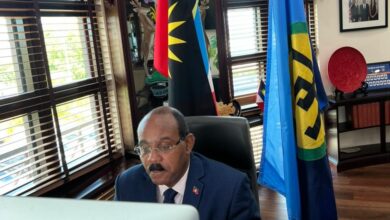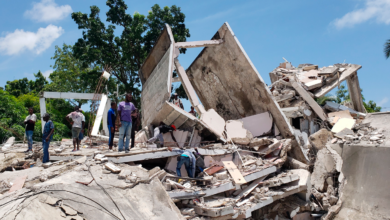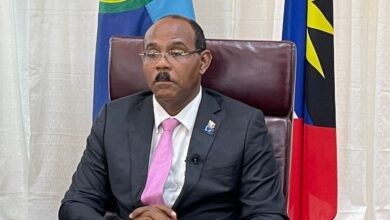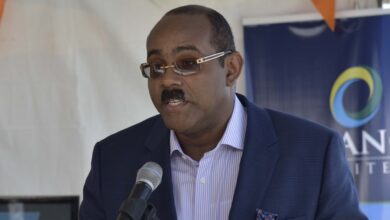Prime Minister of the Federal Democratic Republic of Ethiopia
Minister of Finance of Ethiopia
Mr. Ban Ki-Moon, the United Nations Secretary-General
Mr. Sam Kutesa, President of the UN General Assembly
Distinguished Heads, Ministers, Excellences
Distinguished Guests, Ladies and Gentlemen,
Mr. President,
I stand before you as a representative of a small island state.
Better than most, my people know that access to finance is one of the most significant obstacles to our development.
In that context, I thank the government and people of Ethiopia for hosting this conference and for joining with the UN to focus global awareness on the absolute need for development finance.
But, I have to express disappointment that this conference is so poorly attended by Heads of Government for whom it is intended.
I have to hope that the high-level representatives of governments gathered here have come armed with a mandate to make a difference.
I have to hope that we are gathered in solidarity and partnership, determined not just to affirm commitments but also to deliver tangible resources that make them meaningful.
For as Secretary-General, Ban Ki-Moon, rightly pointed out this morning, “Without resources, commitments will amount to little more than promises on paper”.
This conference faces a crucial test.
Will it shift from a business-as-usual posture and, instead adopt a sustainable development approach that commits and delivers funding to eradicate poverty and promote prosperity?
That is the test we face.
If at the end of this Conference, we celebrate yet another high-sounding declaration upon which we fail to deliver, then we would have failed.
And the consequences of our failure will not only be the continued degradation of poor developing countries and small island states, it will also place a future burden on developed countries and international financial institutions.
In order to support the Sustainable Development Goals and a new climate deal; countries need to meet existing commitments, including to mobilize US$100 billion in annual climate finance by 2020, without diverting existing aid.
Mr. President, this is a bargain!
For, the cost of not providing the resources; the cost of doing nothing, will redound to the detriment of rich nations as they are forced to cope with the agony of human displacement, of determined refugees, and the consequences of human misery.
Mr President, since Monterey and Doha some gains have been made among developing countries.
However, there must be no belief that these gains have been uniform or wide spread.
Many countries, including Small Island Developing States (SIDS) have retrogressed and are unable to provide adequately for their people.
They continue to face significant challenges, including low or no growth, high debt to GDP ratios, reduced foreign direct investment, trade flows, and lower domestic savings and capital formation.
All of these have resulted in increased levels of poverty and unemployment.
The reality is, Mr. President, that the economies of SIDS remain weak and vulnerable because of their peculiarities such as small size, remoteness, extremely limited natural resources and export base, as well as exposure to global environmental challenges.
These disturbing conditions are worsened by the effects of climate change.
We have seen more and stronger hurricanes, longer and more devastating droughts.
Each of these incidents erodes the hard won development gains of the past.
We struggle through great sacrifice and with a greater deal of grit, to take one step forward, only to find ourselves knocked two steps backward.
To pull ourselves out of these conditions and to try diligently to maintain a trajectory of growth and development, we have increased our debt stock as governments are forced to borrow at commercial rates to repair damaged infrastructure, year after year.
Instead of recognizing this stark reality, international financial institutions continue to exclude us from concessional financing.
We are, therefore, caught in a spiral of shocks to our economies not of our own making, and incurring high debt so as to mitigate against such shocks.
Mr. President, let us all be clear.
Small states can – and do – implement the most prudent macro-economic policies, including progressive tax systems, prudent financial management and development of their human resources.
But, without financing solutions to resolve their high debts and the attendant debt service, they are fighting a continuous battle that eventually will overwhelm them unless they get help.
The recent global crisis that began in 2008 exposed the vulnerability of SIDS to endogenous and exogenous shocks of a kind different to natural disasters, but no less devastating.
The global crisis decimated capital flows, savings and investment in every small island state, resulting in negative growth and economies that are now teetering on the brink of bankruptcy.
Antigua and Barbuda for example, lost 25 percent of its GDP and many other small island states in the Caribbean suffered from contracting economies.
Prior, to the global crisis, SIDS were challenged to service their debts and to maintain and expand their socio-economic infrastructure.
This challenge has become even more acute through no of fault of theirs.
The Caribbean small island states are among the most indebted globally with five states ranking among the top five in the world.
Forty percent of their outstanding debts, which represent less than one percent of total global borrowings, is due to multi-lateral institutions and developed countries.
This debt burden has resulted in debt service payments ranging between 30 and 65 percent of total annual revenue, which is clearly unsustainable.
The high debt service has significantly reduced fiscal space to fund development; as a consequence, unemployment and poverty have risen exponentially.
And, the Antigua and Barbuda story is not unique; every small island state is in a similar position.
Mr. President
We trust that the declaration emanating from this conference will call for restructuring and gradual debt write-offs for developing countries including vulnerable small island states.
Without such debt relief, we will not have the fiscal space to fund adequate levels of development and to prevent more of our populations descending into poverty.
This necessitates the removal of artificial barriers that preclude our countries from accessing development finance at concessionary rates.
It is time that the false criterion of per capita income for SIDS be totally scrapped and that account be taken of their real circumstances of geographic isolation, high transaction costs, and extreme vulnerability.
It is also time for developed countries to honour their commitments in fulfilling all of their ODA commitments and to scale up allocations to SIDS.
Mr. President, allow me to take this opportunity to let me commend the Government of Sweden, not only in honouring their ODA commitments, but for exceeding those commitments and we trust that other countries will follow their lead
Mr. President, in the context of the development of small states, it is unhelpful for larger developed countries to unfairly label small jurisdictions as tax havens or countries that facilitate terrorism financing and money laundering when the facts clearly show that they are deemed to be compliant with international standards as established by the FATF and Global Forum.
When unsubstantiated allegations of this kind are made, they bring further extreme – but unwarranted – hardships to these jurisdictions.
Mr. President as we seek to obtain sustainable partnership among nations, we look forward to rules and regulations in the global trading system that take account of size and levels of development.
It is not right to expect reciprocity among unequals
Fairness and justice demands that among unequals, there should be proportionality.
Mr. President, despite the gloomy prospects that surround small states, I remain hopeful that this conference will bring about a sustaining partnership between nations, and that it will not be business as usual.
Our world, our planet, our peoples cannot afford it.
I thank you Mr. President.





